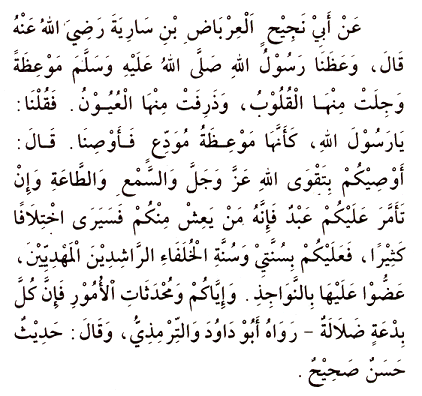

|
|
[This page was last updated: 16/09/02]

It was narrated on the authority of Abu Najih al-Irbad bin Sariyah, radiyallahu 'anhu, who said:
The Messenger of Allah, sallallahu 'alayhi wasallam,
delivered an admonition that made our hearts fearful and our eyes tearful.
We said, "O Messenger of Allah, it is as if this were a farewell
sermon, so advise us." He said, "I enjoin you to have Taqwa
of Allah and that you listen and obey, even if a slave is made a ruler
over you. He among you who lives long enough will see many differences.
So for you is to observe my Sunnah and the Sunnah of the
rightly-principled and rightly-guided successors, holding on to them with
your molar teeth. Beware of newly-introduced matters, for every innovation
(bid'ah) is an error."
[Abu Dawud & Al-Tirmidhi, who says it is an authentic hadith]
background
In one of the narrations of this hadith, it is mentioned that the Prophet, sallallahu 'alayhi wasallam, gave this talk after the Fajr prayer. Based on other hadiths, it was the practice of the Prophet, sallallahu 'alayhi wasallam, to give admonition to his companions from time to time, however, without burdening nor boring them. Ibn Rajab points out the characteristics of the Prophet's, sallallahu 'alayhi wasallam, speeches and admonitions: brief, concise, and conveyed in beautiful understandable manner.
![]()
The admonition consists of three main issues:
The emphasis, then, in the advice given in the hadith is to adhere to the sunnah and to avoid bid'ah (heresy).
lessons
Introductory statements about adhering to the sunnah
The Prophet's, sallallahu 'alayhi wasallam, actions may be classified as follows:
Scholars state that Muslims are only obliged to follow the last type of
action.
Note: An act is considered an ibadah if there are authentic hadiths mentioning that the act is an ibadah, or that it will be rewarded, or that the one who does it is praised, or that the one who does not perform it is blamed or cursed or will be punished.
![]()
Scholars stated that to consider an action as a sunnah, two conditions must be met. Not only are the outward actions of the Prophet, sallallahu 'alayhi wasallam, to be imitated, but the intention of the act must be the same. For example, wearing a turban should not be done with the intention of performing an ibadah. If one has the intention of merely following the Prophet, sallallahu 'alayhi wasallam, then one will rewarded for that intention only.
![]()
Imam Shatibi states the principle that if there are two ways to perform an ibadah, one being easier than the other, then it is obligatory to take the easier way. For example, if on a cold winter's night there is an option of using cold or hot water, then one takes the easy option, i.e. using the hot water. This principle is derived form the Qur'an, Surah al-Baqarah, Ayah 185.
![]()
Another principle that Imam Shatibi states is that when one does a preferable
action or mustahab, one should not commit oneself to doing it in
a set manner. For example, one should not say that he shall read two juzu'
a day, or will fast every Monday and/or Thursday on a continuous basis
without stopping from time to time.
The reasons one should not commit oneself to non-obligatory acts are because:
Therefore, it is better to do good deeds based on one's personal capacity, encouraging oneself to continue performing the deed.
![]()
Imam Shatibi has established that there are two types of bid'ah:
Imam Ahmad Zarouq (899H) adds a third category which is: un-agreed upon heresy or bid'ah khilafiyyah. This is acceptable form of ibadah to some scholars and it is bid'ah according to other scholars such as the later given example.
![]()
General
rules and principles to differentiate between bid'ah and sunnah
(extracted by Imam Shatibi)
An act of ibadah may be performed due to a number of reasons:
An example is that at the time of Imam Malik, it was reported that
the muadhin would purposely clear his throat before giving
the adhan. When he was made to stop by Imam Malik, he would
then purposely hit a stick against the side of the minaret before
giving the adhan. Imam Malik stopped him from doing this
as well, and said, "Do not do something which has not been
practised by the Prophet, sallallahu 'alayhi wasallam, nor
by his companions."
Another example is to stand up immediately after performing the
fardh prayers to perform the sunnah prayers where
people without knowledge may get confused.
A third example is to start fasting the six days of Shawal
from the second day of Eid.
The excuses are:
[Note: according to Ibn Taimiyyah, there are 10 reasons why one isn't
punished, among which are:
Clarification
of the second opinion:
Imam Shatibi argues that you will not find someone committing
an innovation in only one action, i.e. if one commits a bid'ah
in the prayers, it is most likely that he will be committing bid'ah
in zakat, hajj, etc.
Imam Shatibi states that this opinion may be interpreted in three ways:
Based on Hadith 5 of Imam al-Nawawi's collection it seems
that the first opinion is sounder in the case of those who follow the
sunnah in general.
conclusion
In order to adhere to the sunnah and to be able to refrain from heresy (bid'ah), a Muslim needs to fully understand and apply these principles pinpointed by our great scholars. Doing so can also minimize disputes and quarrels among Muslim community members over many debatable issues every now and then.
|
|